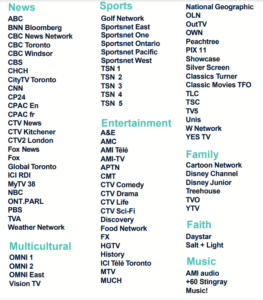
What Is Satellite TV And How Does It Work? – blog
Are you feeling bored as you peruse the same old channels on your cable TV, desperately searching for anything that might interest you? Do you yearn for a more elevated television-watching experience unencumbered by the tangled mess of wires and cables? Look no further, for the solution to all of your problems lies in the realm of satellite TV!
As a purveyor of satellite TV services within the Canadian environment, we empathize with the limitations and subpar picture quality that cable TV can often inflict upon its users. With our innovative technology, however, you can access hundreds of channels boasting clear picture quality, ranging from sports to movies to news and beyond.
In this article, we shall elucidate what precisely satellite TV entails while highlighting the numerous benefits that await those who opt to switch to this superior mode of television transmission. Follow closely.
What Is Satellite TV And How Does It Work?
Satellite TV is a game-changing broadcasting system that leverages futuristic satellite technology to transport digital signals directly into your home’s comforts, fundamentally transforming how individuals consume visual media. Boasting a vast array of hundreds of channels sourced from around the globe, this innovative technology has become a favoured pastime for many Canadians, imparting unparalleled entertainment benefits to its devoted consumers.
Operationally, the technology behind satellite TV necessitates the transmission of digital signals from a satellite located within the expanse of space to a dish antenna securely fastened to either the wall or roof of a customer’s residence. Subsequently, the dish antenna receives the transmitted signals and transmits them to a set-top box, which proficiently decodes the signal, thereafter rendering the content on the customer’s TV. Furthermore, by connecting the set-top box to the internet, viewers can easily access several online contents, such as streaming services, significantly augmenting their entertainment experience.
What Are The Benefits Of Satellite TV?
1. Satellite TV proffers a vast array of channels, encompassing a wide range of genres like sports, news, movies, and international programming. With several channels to opt from, viewers can relish the content they ardently adore, at their leisure.
2. The top-notch picture and sound quality delivered by Satellite TV is nothing short of exemplary. The technology used in Satellite TV ensures unwavering signal stability and reliability, even in the face of harsh weather conditions.
3. The hallmark feature of flexibility sets Satellite TV apart from its competitors, allowing users to record, pause, and rewind their preferred shows. Viewers can access their favourite shows on multiple devices, including smartphones, tablets, and laptops, providing unmatched convenience.
4. The cost-effective pricing options offered by Satellite TV make it a desirable choice for those who are budget-conscious. It presents an enticing option compared to cable TV, allowing users to experience an unparalleled entertainment experience without breaking the bank.
What Are The Pros And Cons Of Satellite TV?
Pros:
1. They are way easier to troubleshoot.
2. Possibility of having more HD Channels available.
3. The viewing options are remarkably versatile, encompassing rural areas, cottages, and mobile homes.
4. Cost-effective.
Cons:
1. Requires a satellite dish installation, which can be expensive.
2. Susceptible to signal disruptions during severe weather conditions.
3. Limited availability in some remote areas.
4. Requires a clear line of sight to the satellite.
What Are The Different Types Of Satellite Tv?
Satellite TV can be classified into two types:
1. Direct-to-Home (DTH) and Direct Broadcast Satellite (DBS). The former relies on a small dish antenna that receives signals directly from the satellite. In contrast, the latter uses an enormous dish antenna to capture signals ricocheted off a satellite.
2. Television receive-only: Television receive-only (TVRO) is an outdated satellite TV technology that utilizes a concave dish and receiver to capture unidirectional signals from satellites. TVRO enables signal reception exclusively, forbidding any feedback transmission. While TVRO was prevalent in the early stages of satellite TV, its antiquated design has since been replaced by the far more efficient two-way communication model of direct-to-home (DTH) satellite TV.
Does Satellite Tv Use The Internet?
Satellite TV does not use the internet to deliver content. Instead, it uses satellite technology to transmit digital signals directly to a customer’s home.
Can Satellite Tv Work Without A Dish?
No, satellite TV requires a dish antenna to receive signals from the satellite.
What Is The Difference Between Satellite TV And Cable TV?
The delivery of television programming is an intriguing subject, with two prevalent forms being satellite TV and cable TV. To illuminate some of the discrepancies between them, consider the following:
Delivery: Satellite television is obtained via a dish that intercepts signals from orbiting satellites, whereas cable television is conveyed through a complex web of interwoven coaxial cables, snaking their way through the urban landscape.
Coverage: Satellite TV has a broader range than cable TV, granted there is an unobstructed line of sight to the satellite. Cable TV is restricted to areas where cable infrastructure has been implemented.
Signal Quality: Satellite TV generally surpasses cable TV in terms of picture and sound quality, as it is not susceptible to signal degradation due to distance from the source or interference from other signals.
Cost: Satellite TV typically has a lower price than cable TV, as there are no infrastructure expenses linked to the installation and maintenance of cable lines.
Programming: Satellite and cable TV offer various programming options, such as live sports, movies, and television shows. However, satellite TV may boast more diverse international and specialty programming options than cable TV.
Is Satellite Tv Better Than Cable?
Satellite TV suits viewers seeking broader channel offerings and more flexible viewing options, whereas Cable TV caters to those prioritizing quicker internet speeds and a more consistent signal.
What Is The Future Of Satellite Tv?
Predictions suggest that Satellite TV will persist as a preferred entertainment medium for years to come. Satellite TV providers continuously upgrade their service quality with technological advancements, introducing novel attributes and advantages for their clientele.
Final Remark!
So, if you’re keen to heighten your TV-watching experience, transitioning to Satellite TV may be the optimal solution. Offering a vast array of channels, high-definition programming, and dependable signal strength, it’s the ideal choice for Canadians seeking unparalleled viewing pleasure. Reach out to us today at Canquest.com to explore our Satellite TV amenities and discover how we can aid in facilitating the switch.







